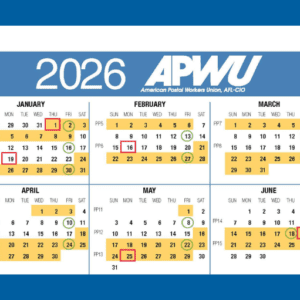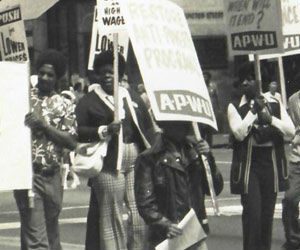September 15, 2016
Stop Staples Campaign Milestones
(This article first appeared in the September-October 2016 issue of The American Postal Worker magazine)
For almost three years, the Stop Staples campaign has held spirited rallies at Staples stores, exposing the threat to service, postal jobs and the public Postal Service. Protestors have organized sustained campaigns in and around San Francisco, Atlanta, Pittsburgh and Boston, where the Staples trial was launched, and in Philadelphia and New York City. It isn’t possible to recount all the important events and great work, but here are some campaign milestones.
Nov. 10, 2013: The USPS announces the launch of a deal that had been in the works for at least six months: a pilot program to put postal retail units in Staples stores, staffed with low-wage Staples employees. More than 80 pilot sites are planned.
Nov. 20, 2013: In his first meeting with then-Postmaster General Patrick Donahoe, newly-elected APWU President Mark Dimondstein expresses fierce opposition to the program and insists that if the pilot goes forward, the units must be staffed by career postal employees.
Dec. 23, 2014: After management refuses to provide information about the program to the APWU, the union files an Unfair Labor Practice charge with the National Labor Relations Board (NLRB).
January 2014: APWU local, state and retiree chapter leaders across the country hand-deliver letters to Staples store managers, protesting the establishment of postal counters.
Jan. 28, 2014: The first Stop Staples protests takes place in San Francisco and San Jose.
March 4, 2014: More than 75 APWU members and supporters attend Atlanta’s first Stop Staples protest, generating extensive television coverage and other media attention.
March 6, 2014: Staples CEO Ron Sargent announces that the chain will close 225 stores by the end of 2015, providing a stark illustration of the dangers of postal privatization: Unlike the USPS, Staples can close stores – and their faux post offices – without any public input.
April 5, 2014: Hundreds of activists attending a Chicago Labor Notes conference take to the streets to protest the USPS-Staples deal.
April 7, 2014: Just prior to the start of an NLRB hearing on APWU charges, the USPS hands over “smoking gun” documents about the shady deal with Staples. Most of the information is redacted, but the documents reveal the true intent of the program: Privatize retail operations and avoid USPS labor costs.
April 15 and 16, 2014: APWU holds Telephone Town Hall calls to discuss the Staples deal with union members.
April 16 and 19, 2014: Dimondstein spreads the message nationally with appearances on The Ed Show and the Craig Melvin Show on MSNBC.
April 24, 2014: Protests are held in 56 locations across 27 states in a Stop Staples National Day of Action. The protests receive extensive media coverage, including 1,196 television reports and widespread radio, online and print articles. At the Washington, DC, rally, Dimondstein calls for a nationwide boycott of Staples stores.
April 30, 2014: The California Federation of Teachers becomes the first non-postal union to vote to join the Staples boycott. It is soon followed by many others.
June 2, 2014: Stop Staples activists protest at the company’s Annual Shareholders meeting in Palo Alto, CA.
June 17, 2014: The APWU opens a new Stop Staples front in Pittsburgh.
July 12, 2014: Thousands of delegates to the American Federation of Teachers’ National Convention protest Staples after voting to support the boycott.
July 14, 2014: Staples announces that the company is terminating its no-bid deal with the Postal Service and replacing it with an “Approved Shipper” program. APWU calls the announcement a ruse, saying it is nothing more than a name-change. The attempt at trickery shows the campaign is having an effect.
July 22, 2014: At the APWU’s National Convention, thousands of union members, AFL-CIO President Richard Trumka, Rev. Jesse Jackson and leaders of the Chicago Teachers Union protest at a Chicago Staples store.
August 2014: The campaign opens a new front in and around Boston, near Staples’ headquarters.
Aug. 13, 2014: An NLRB judge rules that the USPS engaged in delaying tactics that constituted an unlawful refusal to provide the APWU with information about its deal with Staples.
Oct. 7, 2014: The APWU opens a new front in Philadelphia, holding a large rally with members of the Philadelphia Federation of Teachers.
Oct. 7, 2014: As the Stop Staples movement grows, the USPS and Staples up the ante: Management notifies the APWU that it plans to expand the program to more Staples stores.
Jan. 6, 2015: Donahoe admits that the boycott is working. In a farewell address to reporters, he notes that as a result of the APWU campaign, “It’s now tougher for us to find retail partners.”
June 26, 2015: Region 5 of the National Labor Relations Board issues a complaint charging that the USPS illegally subcontracted work to the office-supply chain and orders management to return the work to the APWU bargaining unit.
July 8, 2015: The Postal Regulatory Commission coughs up 231 documents that shed new light on the secretive deal between Staples and the USPS, in response to a lawsuit filed by the APWU. The documents confirm that the Staples’ deal was intended to serve as a model for transferring postal retail operations to private retailers.
Aug. 17, 2015: Hearing begins before the NLRB on charges that the Postal Service illegally subcontracted work to Staples.
Oct. 20, 2015: After months of refusing to provide documents, the USPS and Staples produce a mound of paperwork, less than two weeks before an NLRB hearing.
Winter 2016: Protests continue and the boycott grows.
March 24, 2016: United Students Against Sweatshops holds a Day of Action at Staples locations.
May 24, 2016: After nearly a year of procedural wrangling and 10 days of testimony, the NLRB hearing on charges that the USPS illegally subcontracted work to Staples ends.
June 1, 2016: CEO Ron Sargent announces that he will resign at the June 14 shareholders meeting.
June 15, 2016: In a major win for the APWU, the NLRB orders the Postal Service to immediately provide the APWU uncensored copies of documents about the pilot program that established postal counters inside Staples stores.
Locals Keep Up the Fight
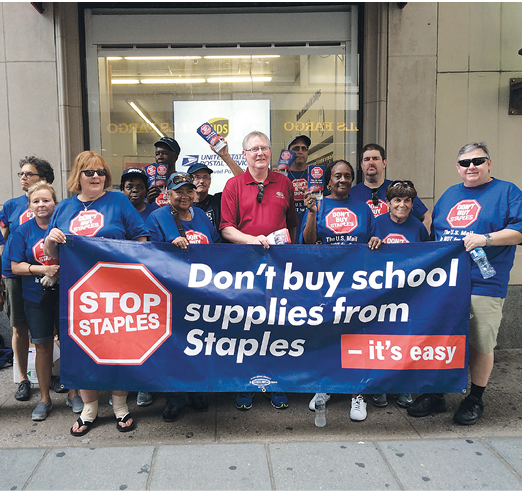
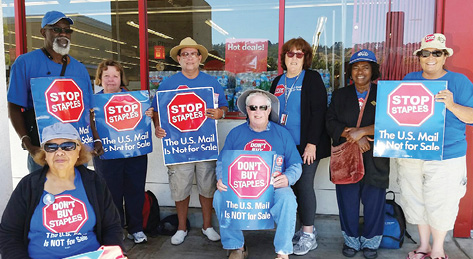
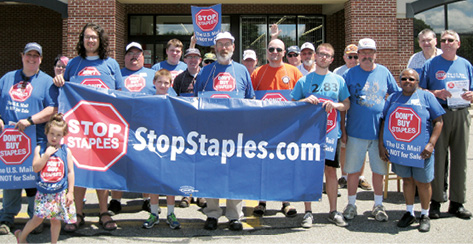
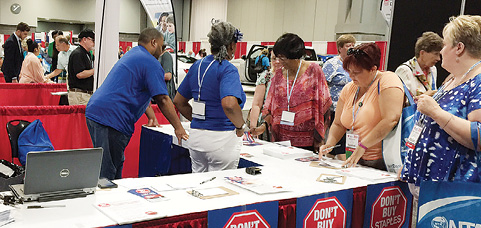
Important Allies
Stop Staples activists passed out flyers and postcards at the conventions of the American Federation of Teachers (AFT) and the National Education Association (NEA). School supplies account for roughly one-third of Staples’ revenue, so support among teachers is critical.


